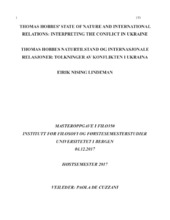Thomas Hobbes naturtilstand og internasjonale relasjoner: Tolkninger av konflikten i Ukraina
Master thesis
Permanent lenke
https://hdl.handle.net/1956/18246Utgivelsesdato
2017-12-04Metadata
Vis full innførselSamlinger
- Department of Philosophy [240]
Sammendrag
Is the philosophy of Thomas Hobbes still relevant in the study of international relations, and, if so, why and how? While the classical, often labeled «realist» interpretation of Thomas Hobbes’ state of nature is a state of war, there are other ways to interpret it. Guilio Gallarotti and Michael C. Williams present us with two interpretations in which they argue that there are alternative ways of using Hobbes’ state of nature to understand international relations. I will examine the conflict between Russia and Ukraine with the help of Gallarotti and Williams and try to understand how the conflict has evolved and thus if Hobbes’ philosophy is still relevant in modern international relations. I start with a description of Hobbes state of nature and the laws of nature before I introduce three interpretations that can be used on international relations from the philosophy of Hobbes. All are based on Hobbes’ state of nature. First the classical, realist interpretation that the state of nature is a state of war where right is might. I choose to call this the classical Hobbesian interpretation. Secondly, Williams' interpretation that uncertainty among the individuals in the state of nature prevents the individuals from assaulting one another. Thirdly, I will discuss Gallarotti who believes that the state of nature is a place of cooperation. Those who do not cooperate are excluded from further participation. I will apply these interpretations on the conflict between Ukraine and Russia in order to figure out if they can be used to broaden the understanding of the conflict. My conclusion is that Hobbes’ philosophy is still relevant to the study of international relations because Hobbes' state of nature gives us a broad understanding of international relations. There are different ways to understand the conflict in Ukraine depending on the different interpretations and how we apply them. Using right is might we come to the conclusion that Russia had the right to take Crimea because they had the power to take it. Gallarotti’s interpretation on the other hand argues that since Russia is unwilling to cooperate it is justly punished for its unlawful interventions. Williams’ interpretation places itself between the classical Hobbesian and Gallarotti’s interpretations. Williams can be used to advocate that Putin had the right by might, but at the same time that the Russian state was irresponsible and should have stayed away from Crimea. Interestingly, however, all of the interpretations agree that Russia overstepped its right by intervening in the Donbass region in Eastern Ukraine. I use Gallarotti and Williams to get a broader understanding of Hobbes’ philosophy in international relations. By presenting a more nuanced reading of Hobbes, my aim is to show that Hobbes may have more relevance still and could tell us more about international relations than the views presented in classical interpretations.
